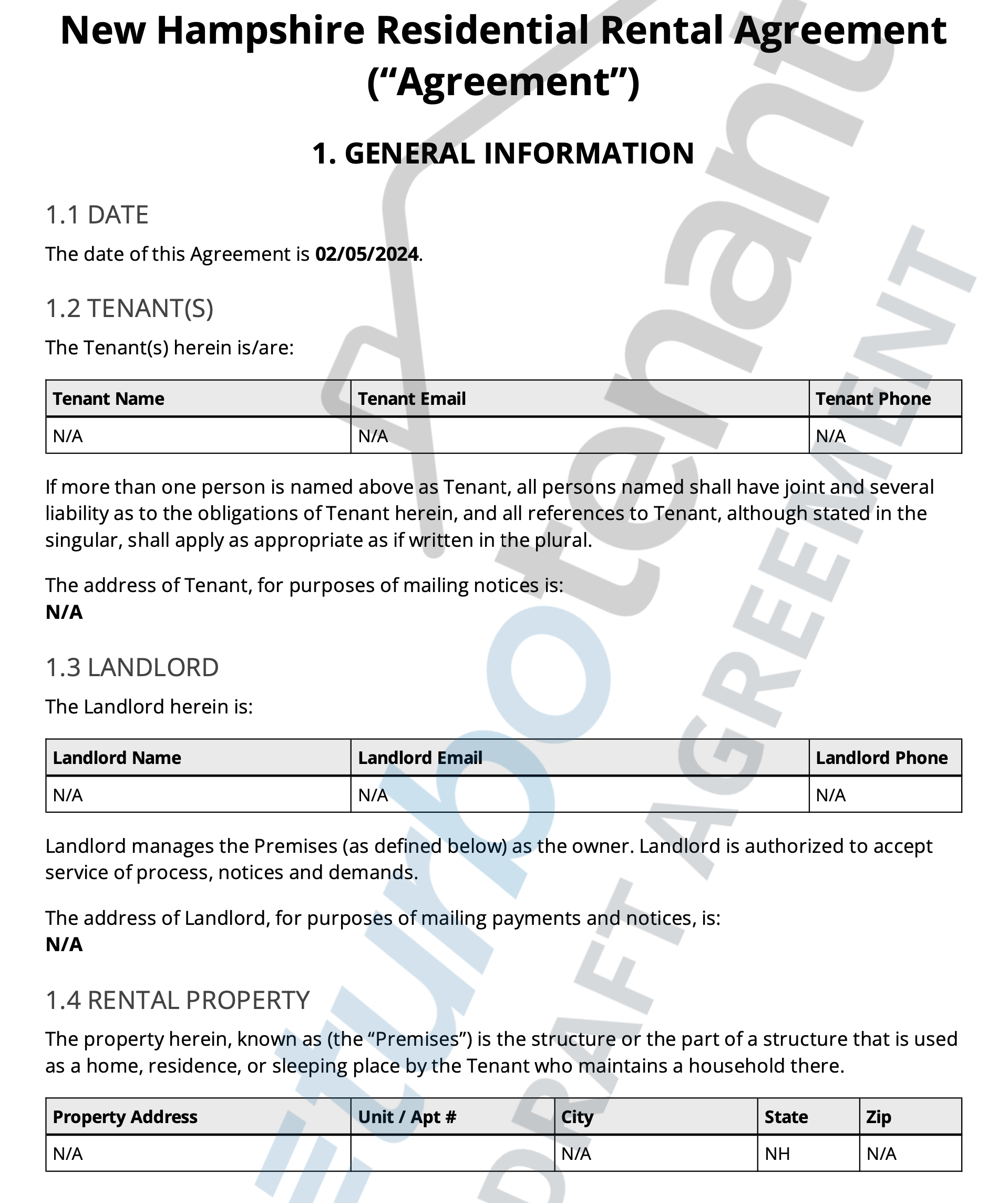
In New Hampshire, lease agreements are vital contracts that establish the terms and conditions under which rental properties are leased by landlords to tenants. These documents are meticulously designed to ensure they meet local legal requirements, providing a framework for the landlord-tenant relationship. TurboTenant’s Lease Agreement Generator and Templates offer a streamlined solution for crafting comprehensive lease agreements tailored to New Hampshire’s legal landscape. This guide explores the essential components and legal stipulations of New Hampshire lease agreements, offering landlords and tenants clarity and security in their rental arrangements.
Customized Lease
A New Hampshire lease agreement begins with customization to reflect the unique details of your rental situation. This includes identifying information for both landlord and tenant, rent specifics, utility responsibilities, and other pertinent details. Customization ensures that the lease accurately represents the terms agreed upon by both parties.
Important Customizable Elements
- Additional Provisions: This section allows landlords to include property-specific rules, necessary local clauses, or any other specifics they wish to add to the lease. It’s recommended to review these additional provisions with a legal expert to ensure compliance.
- Lost Key Policy: If tenants fail to return all keys upon moving out, they are required to cover the full cost of rekeying the property, as stated in this section.
Specific to New Hampshire
This section is tailored to align with New Hampshire-specific legal requirements, ensuring compliance with state laws. It includes clauses that cover various legal aspects relevant to leasing in New Hampshire. If you change any provisions of this section using our Advanced Editor feature, it is advised to review the changes with an attorney to ensure legal compliance with state and/or local laws.
Key Legal Provisions
- Late Fees (Section 2.1): Landlords in New Hampshire can charge a late fee of 5% of the unpaid rent amount if rent is not received by the 7th day of the month.
- Security Deposit Provisions (Section 2.4): New Hampshire law restricts landlords from demanding a security deposit exceeding one month’s rent. Additionally, landlords must return the security deposit within 30 days after regaining possession of the premises.
- Fair Housing (Section 2.11): Federal and New Hampshire laws prohibit housing discrimination based on race, color, religion, national origin, sex, marital status, disability, sexual orientation, gender identity, or familial status. Landlords must comply with these laws and any additional local ordinances.
General Clauses for Best Practices
This section covers general clauses that are standard in most lease agreements, promoting best practices within the landlord-tenant relationship.
Notable General Clauses
- Subletting (Section 3.1): Tenants are prohibited from subleasing the property without the landlord’s written permission.
- Altering or Improving the Property (Section 3.2): Tenants cannot make alterations or improvements to the property without the landlord’s written consent. The property must be returned in the same condition as when the tenancy began.
- Notice of Domestic Abuse Protections (Section 3.8: Tenants have a defense against eviction if they can prove they are victims of domestic abuse, sexual assault, or stalking and that the eviction is related to such incidents.
- Choice of Law (Section 3.11): The lease agreement is governed by New Hampshire law, and parties consent to the jurisdiction of county courts where the property is located.
- Follow the Law (Section 3.14): Tenants must not violate any laws or ordinances while on the property and must refrain from being a nuisance to neighbors. Violations can constitute grounds for lease termination.

FAQ
What can I charge for a late fee in New Hampshire?
Landlords can charge a late fee of 5% of the unpaid rent if it is not received by the 7th day of the month.
How should security deposits be handled in New Hampshire?
Landlords cannot demand a security deposit exceeding one month’s rent. The security deposit must be returned within 30 days after the landlord regains possession of the premises.
Are there specific disclosures required in New Hampshire lease agreements?
Yes, landlords must adhere to fair housing laws and include a notice of domestic abuse protections. These requirements ensure tenants are aware of their rights and protections under the law.
What actions can lead to lease termination?
Violations such as failing to follow laws, causing a nuisance, making unauthorized alterations, or subleasing without permission can lead to lease termination.
TurboTenant New Hampshire Lease Agreements
TurboTenant simplifies the process of creating New Hampshire-compliant lease agreements. By incorporating state-specific legal requirements and best practices, TurboTenant ensures that landlords can confidently enter into lease agreements that protect their property and interests. For landlords seeking comprehensive, legally sound lease agreements in New Hampshire, TurboTenant’s Lease Agreement Generator and Templates offer a reliable solution tailored to the unique legal landscape of the state.
New Hampshire Resources


